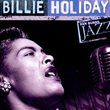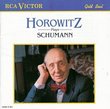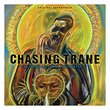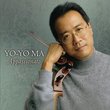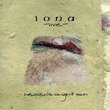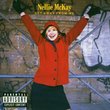| All Artists: Richard Wagner, Sir Georg Solti, Plácido Domingo, Jessye Norman, Wiener Philharmoniker, Wiener Staatsoperchor, Eva Randova, Hans Sotin, Siegmund Nimsgern Anna Gonda, Peter Jelosits, Thomas Mohr Dietrich Fischer-Dieskau Title: Lohengrin Members Wishing: 0 Total Copies: 0 Label: Polygram Records Release Date: 10/25/1990 Genre: Classical Style: Opera & Classical Vocal Number of Discs: 4 SwapaCD Credits: 4 UPC: 028942105324 |
Search - Richard Wagner, Sir Georg Solti, Plácido Domingo :: Lohengrin
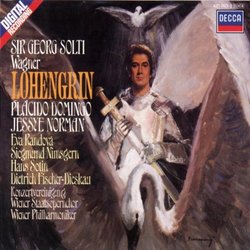 | Richard Wagner, Sir Georg Solti, Plácido Domingo Lohengrin Genre: Classical
Sir George Solti's renditions of Wagner's operas often defined the standard interpretation practice in the post-World War II musical world, and he is at his best in this late 1980s digitally mastered recording partnered wi... more » |
Larger Image |
CD DetailsSynopsis
Amazon.com essential recording Sir George Solti's renditions of Wagner's operas often defined the standard interpretation practice in the post-World War II musical world, and he is at his best in this late 1980s digitally mastered recording partnered with his long-time collaborators, the Vienna Philharmonic--perhaps the most emotionally satisfying orchestra in the world for these challenging scores. Domingo, in the title role, shows himself as a true Heldentenor (i.e. a baritone with high notes), and his earlier weakness in German diction is not apparent. Norman's Elsa is musically perfect though at times a bit chilly and distant. The mature compassion of the role of Henry the Fowler is admirably captured by Sotin. The chorus work is first rate, and the excellent cast is rounded out by Randova and the vigorous Nimsgern as the husband/wife villains. --Christian C. Rix Similarly Requested CDs
|
CD ReviewsA gripping, haunting "Lohengrin," best I've ever heard madamemusico | Cincinnati, Ohio USA | 12/30/2000 (5 out of 5 stars) "As someone who owned the Kempe "Lohengrin" for many years, then sold it to a used-record shop as hopelessly boring, let me add my voice to the chorus of praise for this particular recording. Granted, Ludwig and Fischer-Dieskau sang beautifully on the Kempe version, but except for "Entweite Gotter!" Ludwig did NOT have the same evil, crafty sound that Randova projects here, and Nimsgern has a richer, darker, more appropriate "Black Forest"-sounding voice for Telramund. More to the point, Domingo is far better than Jess Thomas--even in the opera house, his voice had that incipient wobble you hear on the recording--and Jessye Norman is vastly better than Grummer at this stage in her career (she was getting on in years and in vocal decline).I smiled a little to myself when reading others' comments about how Norman sounds "inappropriate" for the role because of her richer "mezzo quality." It's funny how listening to "canned opera" can condition your perceptions. In the LP/CD era, all Elsas are high sopranos, but back in the 1930s and '40s Elsa was sung by sopranos like Kirsten Flagstad and Helen Traubel, singers with big, rich, mezzo-like timbres. And, frankly, it was a real pleasure for me to hear her sounding somewhat dramatically involved in the music. In person this is never a problem, but on records La Norman often tends towards blandness and boredom. Here, she is anything but boring.The glue that holds this recording together, however, is Solti. Never have I heard the music of "Lohengrin" sound more unified, more dramatic, more shapely. Even at leisurely tempos, Solti keeps things moving forward, ever-so-slightly, the way Toscanini used to do with "Tristan" (listen to his classic 1952 reading of the Prelude and Liebestod, and you'll see what I mean). Towards the end of Act 1, I suddenly realized that what I was listening to was a towering, monumental reading of the score, one that slowly, inexorably, yet pleasurably draws the listener inward." You can't go wrong with this (or the Kempe) Laon | moon-lit Surry Hills | 11/14/2000 (5 out of 5 stars) "This is one of the two best nearly-complete _Lohengrin_ recordings. The other is the famous second Kempe set, with Jess Thomas as Lohengrin -- as opposed to Kempe's older mono set with George Vincent in the title role. Of the Solti and the second Kempe, I don't think it matters much which recording you get. (I hear the Abbado set is excellent as well, but I haven't heard it.) The Kempe set has been rightly regarded as a classic recording since its release. It's an ideal ensemble cast, with justly admired conducting, and a good clear, full stereo recording. The Solti set offers a cast that is every bit as good, though in a slightly more complex way. That is, Domingo is a noticeably better Lohengrin than Thomas, though both are in the front rank. (Sandor Kolya from Leinsdorf's complete set is the finest Lohengrin on record, but he graces a set whose merits are even more complicated. There are two full and complete _Lohengrin_ sets, in which the cut in the second part of Lohengrin's "In fernen Land" Narration is - rightly - restored: a recent set by Barenboim and an older set by Leinsdorf. Neither are as good, overall, as Kempe or Solti. Of the two - see my review of the Leinsdorf set, if you're interested - I'd give the edge, though narrowly, to the Leinsdorf.) Some reviewers have claimed Domingo's Lohengrin has a faint Spanish accent, but I must confess I can't hear it. If I did notice it I would have no more problem with it than with Simon Estes' slight but noticeable American accent as the Dutchman in the generally superb Nelsson _Fliegende Holländer_ set. Wagner is an international phenomenon, and so is opera. What would be a genuine problem would be if Domingo's German seemed shallow; that is, if he were simply singing the notes beautifully, without directly feeling and expressing the meaning of the words. And while that criticism has been made, I think it untrue and unfair of this performance, which is both beautifully sung and convincingly acted. The criticism seems more reasonable of Domingo's Tannhäuser for Sinopoli, and to a lesser extent of his Walther in the Jochum _Meistersinger_. I suspect that people may have transferred their dislike and criticism of those performances over to this one. As an aside, it would actually be quite appropriate if Lohengrin did have a noticeable Spanish accent. After all, he hails from Montsalvat, which, as we learn in _Parsifal_, is somewhere near the Moorish border in 8th Century Spain. So Domingo takes the honours over Kempe's Jess Thomas in the title role. Thomas is a pleasant and intelligent singer, whose voice is simply not as powerful or as beautiful as Domingo's. On the distaff side, as Elsa Jessye Norman offers a fuller, creamier soprano than Kempe's Elizabeth Grümmer, but Norman's voice is too big, too confident and paradoxically too beautiful really to be in character as Wagner's naïve visionary: Wagner's Joan of Arc without the military ambition. Kempe's Grümmer is the better Elsa, though I'd say that Eleanor Steber in the mono Keilberth set, with Windgassen good but not among the very best in the title role, is perhaps the best Elsa in a "complete" _Lohengrin_ set. As von Telramund and Ortrud, Solti's Nimsgern and Randova are often said to be outclassed by Kempe's Fischer-Dieskau and Christa Ludwig, and this is true. For Kempe, Fidi and Ludwig are in their prime and abolutely unbeatable. On the other hand, I find the bad guys' big Act II scene is more sinister in the Solti than in the Kempe; Solti loses on beauty, especially with Randova compared to Ludwig, but wins out on drama. The twisted sophistication of the orchestral part at the beginning of Act II, through to Elsa's appearance, seems more modern and dissonant in Solti; and that is an advantage. In fact I would give Solti's Vienna Phil the advantage, though only very marginally, over Kempe's Vienna Phil. Solti's other advantage is an unfair one, but a powerful one in Wagner; his is a clearer and more immediate recording. My main complaint applies equally to both sets. Once you've heard the music cut from the Narration, you will tend to resent that cut. It is beautiful music, and dramatically it allows Lohengrin's hearers (and the operatic audience) more time to be transported to Montsalvat, and to come back to earth with an even bigger bump to face the unpleasant realities of the dramatic situation. Solti especially was a great restorer of cuts, producing the first truly complete recording of Strauss's _Der Rosenkavalier_, for example. So why didn't he restore this one? It was aesthetically the right thing to do, and I'm surprised Solti of all people passed up the marketing opportunity. But either set is superb. Whichever you buy, you can't go wrong. Cheers!Laon" The Overall Best Wilbourg | Anywhere | 02/15/2002 (5 out of 5 stars) "Let's face it pefection is lost to us in this glorious opera. Here then is an analysis by relative strengths. The best overall Lohengrin tenor is the incomparable Sandor Konya, but the overall recording of the opera is fairly pedestrian. The best conducting and marshalling of forces is Karajan's but his tenor, Rene Kollo, strains so much he makes you uncomfortable. The best recording sans the tenor and soprano parts is Kempe's (And who can deny Frick's glorious King with that world-beating resonant bass booming out!) but Jess Thomas, Kempe's Lohengrin, while strong, cannot hope to compete with Domingo, Konya, or Sieffert. The best nuanced recording is the Barenboim/Sieffert but its dramatic impact is muted when compared to the others.What we are left with is which Lohengrin recording, if you only had enough cash for one recording, and one only, most readily conveys the power, the depth and, most importantly, the beauty of this, Wagner's greatest (arguably) complete opera?The answer is simple: This one, the Solti/Domingo/Norman. Why? Well, it may not take top rank in all of the categories but it is not far from the top in any. I prefer Konya over all Lohengrins but, guess what? Domingo is just fine and, in many places, glorious. I'll take Karajan's take-no-prisoners dramatic approach any day over Solti, but again, Solti does just fine. Barenboim may find little delights in the music, but Solti and his forces are no slouches in this department either. Much of singing has a chamber appeal and you can hear Solti riding herd on the orchestra so that they might bring nuance to bear in crucial moments.So, all in all, this is the one Lohengrin to have. It is the pillar to post recording that most satisfies. It is strong in every area. In a perfect world, we would get Karajan conducting Konya with Vienna in the pit and with Frick as the King. But since we are not living in a perfect world, the Solti/Domingo will do just fine."
|

 Track Listings (12) - Disc #1
Track Listings (12) - Disc #1
